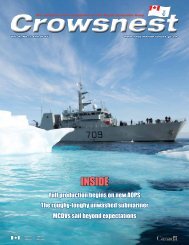Create successful ePaper yourself
Turn your PDF publications into a flip-book with our unique Google optimized e-Paper software.
while <strong>the</strong> Chinese leadership remains focused on maintaining domestic political stability—no<br />
mean task in such a large <strong>and</strong> populous country. 224 It may be, as some have argued, that Beijing<br />
believes by “balancing economic <strong>and</strong> military development, [it] may rise to great power status<br />
sustainably <strong>and</strong> with minimal foreign opposition.” 225 Likewise, most US policymakers (<strong>and</strong> most<br />
likely those in China) underst<strong>and</strong> that stability in Asia is a function <strong>of</strong> <strong>the</strong> Washington-Beijing<br />
relationship. This includes confronting <strong>the</strong> threat <strong>of</strong> instability on <strong>the</strong> Korean peninsula where<br />
China is acknowledged as <strong>the</strong> most effective interlocutor with Pyongyang.<br />
<strong>The</strong>re are, never<strong>the</strong>less, areas where significant bilateral tensions are proving intractable, with<br />
potentially dangerous consequences for strategic stability. <strong>The</strong>re are serious disagreements over<br />
human rights issues <strong>and</strong> each o<strong>the</strong>r’s economic policies. Beijing categorically opposes<br />
Washington’s leadership role in Asia, especially its relationship with Taiwan. US efforts to<br />
reassure US allies through improved defence contacts <strong>and</strong> arms sales (particularly to Taiwan) are<br />
viewed as threatening <strong>and</strong> frequently inflame Sino-US relations. 226 Moreover, China’s drive to alter<br />
<strong>the</strong> regional status quo means that it has less <strong>of</strong> an interest in transparency <strong>and</strong> confidence-building.<br />
Initiatives to create stronger military-to-military ties have, <strong>the</strong>refore, borne little fruit <strong>and</strong><br />
Washington is <strong>of</strong>ten uncertain how to interpret Chinese behaviour.<br />
Military modernisation <strong>and</strong> expansion, <strong>and</strong> <strong>the</strong> strategic options that <strong>the</strong>y are creating for Beijing,<br />
are <strong>the</strong> most tangible characteristics <strong>of</strong> <strong>the</strong> challenge China represents for Washington. Chinese<br />
policies are intended to increase <strong>the</strong> cost to Washington <strong>of</strong> maintaining its leadership in Asia. As<br />
a US strategist has written, “China has been working systematically to undermine <strong>the</strong> American<br />
approach to assurance, deterrence, <strong>and</strong> warfighting.” 227 <strong>The</strong> growth <strong>of</strong> China’s defence expenditure<br />
that has enjoyed annual double-digit increases during <strong>the</strong> past 25 years—in 2014 alone it grew by<br />
12.2 percent—has led to a vast increase in its military capabilities, in particular those <strong>of</strong> its navy<br />
(see Table 5). 228 <strong>The</strong> speed with which <strong>the</strong> PLA(N) has developed a wide array <strong>of</strong> modern<br />
platforms <strong>and</strong> capabilities, some rivalling those <strong>of</strong> <strong>the</strong> United States Navy (USN), as well as<br />
infrastructure, have taken planners in Washington by surprise. 229 <strong>The</strong> acquisition within <strong>the</strong><br />
Chinese arsenal <strong>of</strong> increasingly sophisticated anti-access capabilities is especially worrying (see<br />
Table 6). Elaborating on this, a former US Secretary <strong>of</strong> Defense stated in May 2010 that a<br />
combination <strong>of</strong> lethal missiles <strong>and</strong> submarines “could end <strong>the</strong> operational sanctuary our Navy has<br />
enjoyed in <strong>the</strong> Western Pacific for <strong>the</strong> better part <strong>of</strong> six decades.” 230 Raising <strong>the</strong> costs <strong>of</strong> US<br />
power projection into Asian waters beyond what Washington views as tolerable, is at root <strong>the</strong> aim<br />
<strong>of</strong> China’s current maritime strategy. Ideally from China’s perspective, it would overturn <strong>the</strong><br />
224 Clapper, Director <strong>of</strong> National Intelligence, Worldwide Threat Assessment <strong>of</strong> <strong>the</strong> US Intelligence<br />
Community, p. 19.<br />
225 Andrew S. Erikson <strong>and</strong> Lyle J. Goldstein, “Studying History to Guide China’s Rise as a <strong>Maritime</strong> Great<br />
<strong>Power</strong>”, Harvard Asia Quarterly Vol. 12, Nos. 3-4, Winter 2010, p. 38.<br />
226 See Adam P. Liff <strong>and</strong> G. John Ikenberry, “Racing toward Tragedy? China’s Rise, Military Competition<br />
in <strong>the</strong> Asia-Pacific, <strong>and</strong> <strong>the</strong> Security Dilemma”, International Security Vol. 39, No. 2, Fall 2014, pp. 52–91.<br />
227 Thomas G. Mahnken, Asia in <strong>the</strong> Balance: Transforming US Military Strategy in Asia, (American<br />
Enterprise Institute: Washington, D.C., June 2012), p. 9 <strong>and</strong> United States, Department <strong>of</strong> Defense,<br />
Quadrennial Defense Review 2014 (Washington, D.C., March 2014), p. 6.<br />
228 Liff <strong>and</strong> Ikenberry, “Racing Toward Tragedy?”, p. 66.<br />
229 John Pomfret, “Defense Secretary Gates: U.S. Underestimated Parts <strong>of</strong> China’s Military Buildup”, <strong>The</strong><br />
Washington Post, 9 January 2011.<br />
230 Michael Richardson, “<strong>Naval</strong> powers in Asia: Rise <strong>of</strong> Chinese navy changes <strong>the</strong> balance”, <strong>The</strong> Straits<br />
Times, 10 May 2010.<br />
48 DRDC-RDDC-2016-R085




